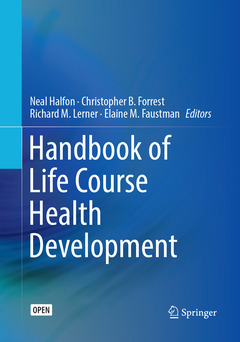Description
Handbook of Life Course Health Development, Softcover reprint of the original 1st ed. 2018
Coordinators: Halfon Neal, Forrest Christopher B., Lerner Richard M., Faustman Elaine M.
Language: English
Subject for Handbook of Life Course Health Development:
Keywords
ACEs and health development science; Adverse childhood experiences and health development science; Autism and health across the life course; Biological embedding and health outcomes; Chronic kidney disease across the life course; Community and heath development; Developmental origins of chronic illnesses; Diabetes and life course health; Family and health development; Fetal programming and health development; Health disparities across the lifespan; Hearing loss and health development; Life course health development science; MCH and health development science; Maternal and child health over the life course; Nutrition and health across the lifespan; Obesity and health; Oral health across the life course; Self-regulation and health; Spina Bifada across the life course
Publication date: 09-2018
Support: Print on demand
Publication date: 12-2017
664 p. · 17.8x25.4 cm · Hardback
Description
/li>Contents
/li>Biography
/li>Comment
/li>
This book is open access under a CC BY 4.0 license.
?This handbook synthesizes and analyzes the growing knowledge base on life course health development (LCHD) from the prenatal period through emerging adulthood, with implications for clinical practice and public health. It presents LCHD as an innovative field with a sound theoretical framework for understanding wellness and disease from a lifespan perspective, replacing previous medical, biopsychosocial, and early genomic models of health. Interdisciplinary chapters discuss major health concerns (diabetes, obesity), important less-studied conditions (hearing, kidney health), and large-scale issues (nutrition, adversity) from a lifespan viewpoint. In addition, chapters address methodological approaches and challenges by analyzing existing measures, studies, and surveys. The book concludes with the editors? research agenda that proposes priorities for future LCHD research and its application to health care practice and health policy.
Topics featured in the Handbook include:
- The prenatal period and its effect on child obesity and metabolic outcomes.
- Pregnancy complications and their effect on women?s cardiovascular health.
- A multi-level approach for obesity prevention in children.
- Application of the LCHD framework to autism spectrum disorder.
- Socioeconomic disadvantage and its influence on health development across the lifespan.
- The importance of nutrition to optimal health development across the lifespan.
Neal Halfon, M.D., M.P.H., is the director of the UCLA Center for Healthier Children, Families and Communities. He is also a professor of pediatrics in the David Geffen School of Medicine at UCLA, of health policy and management in the UCLA Fielding School of Public Health, and of public policy in the UCLA Luskin School of Public Affairs. Dr. Halfon’s research has spanned clinical, health services, epidemiologic and health policy domains. For more than a decade, he has worked with national, state and local initiatives aimed at improving early childhood systems. Dr. Halfon has also played a significant role in developing new conceptual frameworks for the study of health and health care, including the Life Course Health Development (LCHD) framework. In 2006Halfon received the Academic Pediatric Associations Annual Research Award for his life time contributions to child health research. He received his M.D. at the University of California, Davis, and M.P.H. at University of California, Berkeley. He completed his pediatric residency at UC San Diego and UC San Francisco. Dr. Halfon was also Robert Wood Johnson Clinical Scholar at UC San Francisco.
Christopher Forrest, M.D., Ph.D., is Professor of Pediatrics and Health Care Management at the Children’s Hospital of Philadelphia (CHOP) and the University of Pennsylvania. He is the Director of the CHOP Center for Applied Clinical Research, which uses life course health development science to adva^5 million children) that conducts patient-centered outcomes research among children and youth. He is the Chair of the Research Committee for PCORnet, the national clinical research network funded by PCORI. He also chairs the Steering Committee for the NIH program called PEPR, which is conducting longitudinal studies on person-reported outcome measures in children with chronic conditions. Dr. Forrest received his BA and MD degrees from Boston University and completed his PhD in Health Policy and Management at




